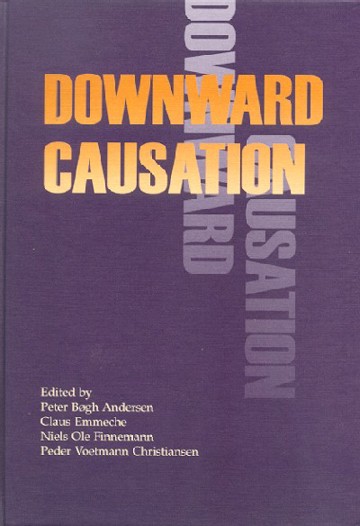
Downward Causation
Minds, Bodies and Matter
A part of the subject areas Philosophy and Cultural studies
Out of stock
Edited by
Peter Bøgh Andersen,
Peder Voetmann Christiansen,
Claus Emmeche and
Niels Ole Finnemann
With contributions by
Peter Bøgh Andersen,
Mark H. Bickhard,
Donald T. Campbell,
Peder Voetmann Christiansen,
Charbel Niño El-Hani,
Claus Emmeche,
Niels Ole Finnemann,
Roberta M. Golinkoff,
Kathy Hirsh-Pasek,
George Hollich,
Jaegwon Kim,
Tove Elisabeth Kruse,
Simo Køppe,
J.L. Lemke,
Alvaro Moreno,
H.H. Pattee,
Antonio Marcos Pereira,
Frederik Stjernfelt,
Ole Togeby and
Michael L. Tucker
More about the book
About the book
Downward causation is found in two-level and multi-level systems with complex behavior generated by many components interacting in a simple or complex way.
The term was coined by the social psychologist and philosopher Donald T. Campbell, who asked the question: If many small-scale interactions can create emergent large-scale patterns, can large-scale patterns reinfluence the small-scale interactions that generated them?
This has led to many further questions, among them: Does the cell as a system reorganize the biochemical processes inside it in a new way? Do psychosomatic illnesses exist? Can life change biochemical laws? Can mind change the body?
The chapters in this comprehensive book address these questions from the viewpoints of different disciplines. Part 1 contains a classification of positions regarding 'downward causation', Part 2 covers physics, Part 3, biology and psychology, Part 4 , social and communicative systems, and Part 5, general philosophy.
Table of contents
Preface
Contents
Part 1 - Introduction:
1. Levels, Emergence, and Three Versions of Downward Causation, Claus Emmeche, Simo Køppe and Frederik Stjernfelt
Part 2 - Physics:
2. Wholeness and Part, Cosmos and Man - in 16th and 17th Century Natural Philosophy and in Modern Holism, Tove Elisabeth Kruse
3. Macro and Micro-Levels in Physics, Peder Voetmann Christiansen
4. Causation, Control, and The Evolution of Complexity, H.H. Pattee
Part 3 - Biology and Psychology:
5. Psychosomatics and the Pineal Gland, Simo Køppe
6. Downward Causation at the Core of Living Organization, Alvaro Moreno and Jon Umerez
7. Higher-level Descriptions: Why Should we Preserve them?, Charbel Nino El-Hani and Antonio Marcos Pereira
8. The Change is Afoot: Emergentist Thinking in Language Acquisition, George Hollich, Kathy Hirsh-Pasek, Michael L. Tucker and Roberta M. Golinkoff
Part 4 - Social and Communicative Systems:
9. Material Sign Processes and Emergent Ecosocial Organization, J.L. Lemke
10. Genres as Self-Organising Systems, Peter Bøgh Andersen
11. Anticipated Downward Causation and the Arch Structure of Texts, Ole Togeby
12. Rule-based and Rule-generating Systems, Niels Ole Finnemann
Part 5 - Philosophy:
13. Making Sense of Downward Causation, Jaegwon Kim
14. Emergence, Mark H. Bickhard with Donald T. Campbell
Contributors
Author Index




